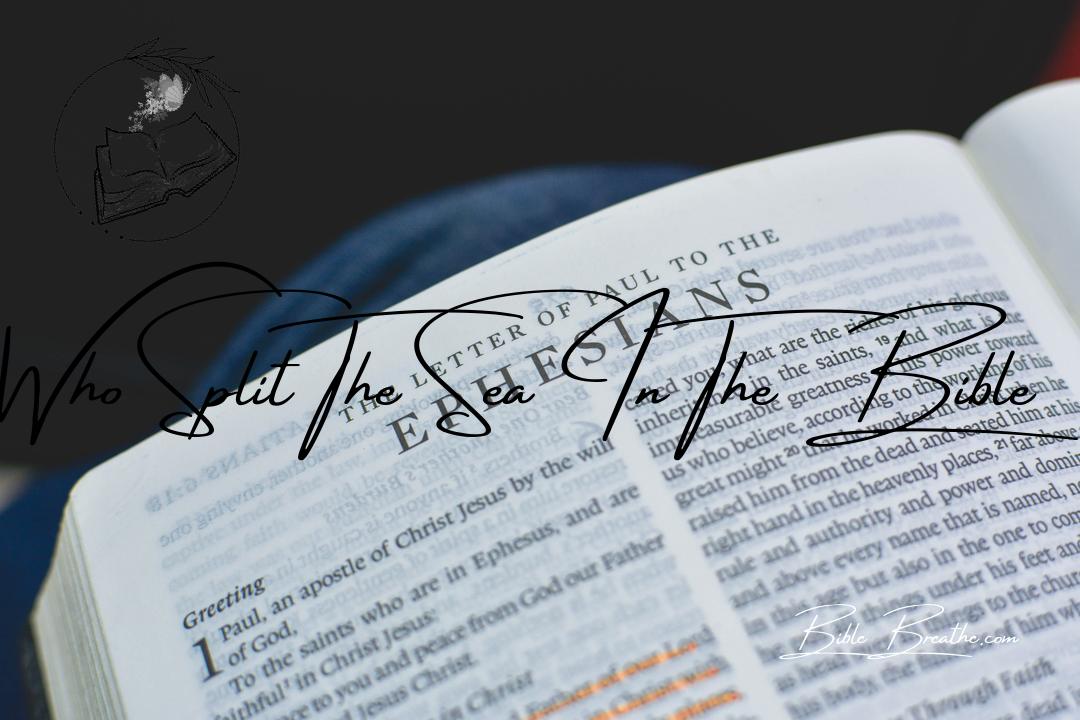Who split the sea in the Bible?
It’s like the ultimate mic drop moment in God’s epic narrative!
Imagine standing at the edge of the Red Sea with Moses as your hype man.
You’re facing an Egyptian army hot on your heels, and bam!
God steps in, parts the waters like a boss, and you’re walking on dry ground.
Now that’s what I call a divine intervention, right?
But wait, there’s more!
Not only did Moses pull off this water-wizardry, but we’ve got Elijah and Elisha, the dynamic prophet duo, parting the Jordan River like they’re splitting the sea for a grand entrance.
These aren’t just history lessons; they’re life lessons in faith, trust, and believing in the impossible.
So, young peeps and grown-ups, join me as we dive into these tales that’ll give you chills and inspire your faith journey.
It’s time to explore the awe-inspiring sea-splits and their timeless message.
🌊📖🙏
Key Takeaways
- The splitting of the sea, often referred to as the parting of the Red Sea, is a powerful example of God’s intervention in human history. It is a recurring theme in the Bible, showcasing God’s miraculous acts on behalf of His people.
- Faith and obedience play a significant role in witnessing such miracles. In the biblical account of the Red Sea crossing, it was Moses’ faith and obedience to God’s instructions that led to the miraculous event. Similarly, throughout the Bible, individuals who trust and obey God often experience His extraordinary interventions.
- Key biblical figures, such as Moses, are instrumental in shaping religious narratives and the understanding of God’s involvement in human affairs. Moses’ leadership and role in the Exodus story are central to the account of the sea splitting, emphasizing the importance of chosen leaders in God’s plan.
- The parting of the Red Sea serves as a powerful reminder of God’s sovereignty and His willingness to act on behalf of His people. It encourages believers to have faith in God’s ability to intervene in their lives, even in the face of seemingly insurmountable challenges. This narrative continues to inspire and strengthen the faith of those who encounter it in the Bible.
Whoa, Let’s Dive into the Sea-Splitting Wonders of the Bible!
Photo modified by BibleBreathe.com. Original photo by Szelei Robert on Pexels
GOD’s Epic Waterworks
In the beginning, God was the ultimate maestro of creation, turning chaos into order like a skilled conductor leading a symphony.
Think of it like a grand masterpiece.
In Genesis 1:6-7, it’s like God waved His creative wand, separating the waters above from the waters below, bringing order to the chaos.
“God said, ‘Let there be a firmament in the midst of the waters, and let it divide the waters from the waters.’ And God made the firmament, and divided the waters which were under the firmament from the waters which were above the firmament: and it was so.” – Genesis 1:6-7 (KJV)
God’s separating act here isn’t just about H2O physics.
It’s a symbol of God’s power, showing us that even when life seems like a stormy sea, He’s the One who can bring calm and clarity.
So, whether you’re facing a turbulent situation or just trying to find balance in the chaos of life, remember that the same God who separated those waters can bring order to your world.
Moses: The Red Sea Magician
Now, picture this scene from ancient history: Moses, leading the Israelites, escaping the clutches of Pharaoh’s army.
They found themselves sandwiched between the Red Sea and their pursuers.
Fear and despair lurking, but Moses had faith.
He stretched out his hand, and a powerful east wind kicked in, creating a path through the sea.
It’s like Moses was holding the keys to a hidden passage.
This amazing moment teaches us about the incredible things that can happen when we trust in God’s plan.
When you’re up against impossible odds, remember that God can make a way where there seems to be no way.
It’s like He can part the Red Seas in your life, providing an escape route you never even imagined.
“And Moses said to the people, ‘Don’t be afraid, stand still, and watch the salvation of the Lord… The Lord will fight for you, and you can hold your peace.'” – Exodus 14:13-14 (KJV)
Joshua’s Jordan Waterwalk
Here’s another jaw-dropping water story: Joshua leading the Israelites across the Jordan River.
In Joshua 3:5-17 through 4:1-18, the Ark of the Covenant played a starring role.
Imagine the priests carrying the Ark stepping into the Jordan, and bam!
The waters stopped, allowing the people to walk across on dry ground.
It was like a divine red carpet laid out for them.
This crossing was a testament to God’s mighty power and His unwavering faithfulness to His people.
It’s like God’s way of saying, “I’ve got your back.”
So, when you’re facing deep, seemingly insurmountable challenges, know that God can make a way for you to cross over to the other side.
He’s the bridge over your troubled waters.
“And it shall come to pass, as soon as the soles of the feet of the priests that bear the ark of the Lord, the Lord of all the earth, shall rest in the waters of Jordan, that the waters of Jordan shall be cut off from the waters that come down from above; and they shall stand upon a heap.” – Joshua 3:13 (KJV)
Elijah’s River Rumble
Now, imagine this: Elijah, the legendary prophet, parting the Jordan River in 2 Kings 2:5-9.
He didn’t use a boat or a bridge; he just smacked the river with his mantle, and presto!
The waters parted, marking the transition of his anointing to his successor, Elisha.
It was like a spiritual torch-passing ceremony.
Elijah’s actions were like saying, “God’s power is not bound by the laws of nature.”
When we face transitions in life, when we’re passing on responsibilities or stepping into new roles, remember that God’s power is with you.
He can open doors that seem closed and make a way when there appears to be none.
“And it came to pass, when they were gone over, that Elijah said unto Elisha, ‘Ask what I shall do for thee, before I be taken away from thee.’ And Elisha said, ‘I pray thee, let a double portion of thy spirit be upon me.'” – 2 Kings 2:9 (KJV)
Elisha’s River Replay
Elisha, now carrying Elijah’s prophetic mantle, also flexed his God-given muscles in 2 Kings 2:12-15.
He used that mantle to part the Jordan River once again.
It was like God’s way of saying, “Elisha, you’ve got this!”
This event reminded us of God’s faithfulness in equipping His chosen servants to fulfill His divine plans.
This river-parting event is like God’s signature move in the “Divine Power” playbook.
When you’re faced with new responsibilities, when you’re stepping into a role you’ve never been in before, remember that God equips those He calls.
Just like Elisha was empowered, you can be too.
So, my friends, these sea-splitting stories aren’t just ancient tales.
They’re life lessons about faith, obedience, and the mind-blowing power of our Creator.
When you find yourself in the middle of life’s stormy seas, remember that God can bring calm, order, and even miracles into your life.
Remember, just as God parted the waters, He can also part the obstacles in your life when you trust His divine plan.
It’s like a supernatural guarantee!
So, stay faithful, keep believing, and know that with God, all things are possible.
Frequently Asked Questions (FAQs) About Who Split The Sea In The Bible
How many times was the water parted in the Bible?
The Bible records two instances of water being parted.
The most famous is the parting of the Red Sea by Moses, described in Exodus 14.
The other is the parting of the Jordan River, led by Joshua, as mentioned in Joshua 3.
Who were the main figures involved in these miracles?
Various individuals were involved in performing miracles throughout the Bible, including prophets like Moses and Elijah, and of course, Jesus, who performed numerous miracles during His ministry.
These miracles often demonstrated God’s power and were essential in teaching important lessons.
What is the significance of these events in Christian theology?
The events in Christian theology hold profound significance, shaping the core beliefs of Christianity.
They include the crucifixion and resurrection of Jesus, the coming of the Holy Spirit, and pivotal moments in salvation history.
These events form the foundation of Christian faith, depicting God’s redemptive plan, love, and grace towards humanity.
How do these events demonstrate God’s power and mercy?
The events demonstrate God’s power and mercy by fulfilling promises, overcoming obstacles, and showing compassion.
In Rachel’s case, her burial in Ramah reflects God’s care for individuals and His sovereignty over family histories.
{
“@context”: “https://schema.org”,
“@type”: “FAQPage”,
“mainEntity”: [
{
“@type”: “Question”,
“name”: “How many times was the water parted in the Bible?”,
“acceptedAnswer”: {
“@type”: “Answer”,
“text”: “The Bible records two instances of water being parted. The most famous is the parting of the Red Sea by Moses, described in Exodus 14. The other is the parting of the Jordan River, led by Joshua, as mentioned in Joshua 3.”
}
},
{
“@type”: “Question”,
“name”: “Who were the main figures involved in these miracles?”,
“acceptedAnswer”: {
“@type”: “Answer”,
“text”: “Various individuals were involved in performing miracles throughout the Bible, including prophets like Moses and Elijah, and of course, Jesus, who performed numerous miracles during His ministry. These miracles often demonstrated God’s power and were essential in teaching important lessons.”
}
},
{
“@type”: “Question”,
“name”: “What is the significance of these events in Christian theology?”,
“acceptedAnswer”: {
“@type”: “Answer”,
“text”: “The events in Christian theology hold profound significance, shaping the core beliefs of Christianity. They include the crucifixion and resurrection of Jesus, the coming of the Holy Spirit, and pivotal moments in salvation history. These events form the foundation of Christian faith, depicting God’s redemptive plan, love, and grace towards humanity.”
}
},
{
“@type”: “Question”,
“name”: “How do these events demonstrate God’s power and mercy?”,
“acceptedAnswer”: {
“@type”: “Answer”,
“text”: “The events demonstrate God’s power and mercy by fulfilling promises, overcoming obstacles, and showing compassion. In Rachel’s case, her burial in Ramah reflects God’s care for individuals and His sovereignty over family histories.”
}
}
]
}


